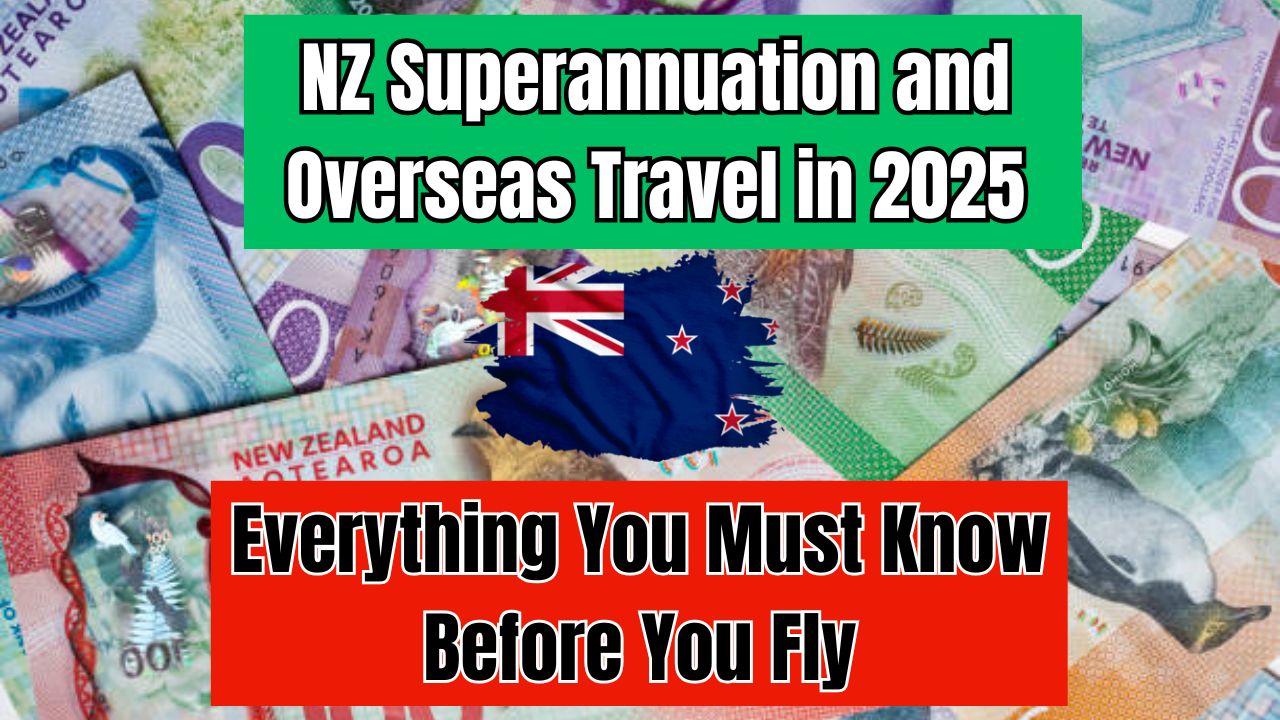NZ Superannuation and Overseas Travel: If you are receiving New Zealand Superannuation (NZ Super) and planning an international trip in 2025, it’s crucial to understand how your travel can affect your payments. With updated monitoring systems and stricter regulations now in place, a simple oversight could lead to your pension being suspended, reduced, or even cancelled. This comprehensive guide covers everything you need to know about travelling abroad while on NZ Super in 2025, ensuring you stay compliant and financially secure.
How NZ Superannuation Works with Overseas Travel in 2025
Under New Zealand law, NZ Super is intended to support individuals who live in New Zealand. Therefore, if you leave the country, even temporarily, your payments might be impacted depending on the length of your trip and where you are travelling.
As of May 2025, the Ministry of Social Development (MSD) has reinforced its policies, meaning stricter oversight and faster suspension of payments for non-compliance.

Important Rule: 26-Week Limit
Your NZ Super may terminate if you are abroad for more than 26 weeks, or roughly six months, unless you are eligible for an overseas payment plan.
Short trips under 26 weeks usually don’t affect your payments, but you must still inform MSD before leaving New Zealand.
Failing to notify MSD or overstaying without approval could lead to:
- Immediate suspension of your NZ Super
- Overpayment recovery demands
- Long-term impact on your eligibility
Important Guidelines to Adhere to Before Taking an NZ Super Cruise Abroad.
To avoid any disruption to your payments while travelling abroad in 2025, follow these important steps:
1. Notify MSD in Advance
This applies even if you’re going away for just a few weeks. Notification ensures your payments are adjusted correctly and avoids accidental overpayments.
2. Respect the 26-Week Limit
You must apply for if you intend to stay abroad for more than 26 weeks:
- Special Portability
- Direct Payment schemes
These schemes allow certain individuals to continue receiving NZ Super while living abroad under specific conditions.
3. Maintain Your NZ Residency
You must continue to be regarded as a New Zealand resident in order to be eligible for NZ Super. Extended stays overseas could lead MSD to question your residency, especially if:
- You spend more time abroad than in New Zealand.
- You shift your “centre of life” (home, finances, healthcare) outside New Zealand.
4. Apply for Overseas Payments
If you move to one of these countries, you may qualify to keep receiving NZ Super payments.
Each agreement has specific conditions, so verify your eligibility early.
5. Report Changes Immediately
If your travel plans change — such as staying longer or returning earlier — you must update MSD immediately.
Failing to report changes could result in overpayments that you must repay later.
SBIF Asha Scholarship Program 2025 for Overseas Education – Apply online before Deadline (30 April)
Centrelink $1769 Payment for 2025 – Full Guide of this Support Payment!
NZ Super Payments and International Agreements in 2025
New Zealand has signed bilateral agreements with several countries, allowing the portability of superannuation benefits abroad.
Countries with Social Security Agreements (SSA)
If you move to one of these countries, you may be eligible to receive your NZ Super, subject to specific conditions:
- Australia
- United Kingdom
- Canada
- Ireland
- Netherlands
- Denmark
- Greece
- South Korea
- Malta
- Germany
Latest Update for NZ Superannuation and Overseas Travel
Negotiations are ongoing with Japan and several European nations to expand SSA coverage, but no new agreements have been finalized as of May 2025.
Important: You cannot simply move anywhere and expect to receive NZ Super. Each SSA country has strict eligibility criteria, such as residency requirements or minimum contribution histories.
For the most recent information, always visit the website of Work and Income New Zealand.
Special Portability to Pacific Countries
A unique Special Portability Arrangement exists for certain Pacific nations, allowing eligible individuals to continue receiving NZ Super if they move there.
Eligible Pacific Countries:
- American Samoa
- Cook Islands
- Fiji
- Kiribati
- Niue
- Samoa
- Tokelau
- Tonga
- Vanuatu
- Tuvalu
- Solomon Islands
- Papua New Guinea
- French Polynesia
- Wallis and Futuna
- Nauru
- New Caledonia
- Marshall Islands
- Northern Mariana Islands
- Guam
- Federated States of Micronesia
- Palau
- Pitcairn Island
TS Inter Results 2025 for 1st & 2nd Year: Download Link, Result Date, and Full Guide
Student Visa Cancellation News: Trump Reverses Stance on Canceling Student Visas
Eligibility Requirements for NZ Superannuation and Overseas Travel
- You must qualify for NZ Super or Veteran’s Pension before leaving.
- You must reside in the Pacific country when each payment is made.
- You must have been living in New Zealand when applying for portability.
- Partners not personally entitled to NZ Super cannot receive payments abroad.
Payment Rates
- Living in New Zealand for more than 20 years since the age of 20 entitles you to the full basic pension rate.
- 10–19 years of residence = A proportional rate (1/20th per year)
- Fifty percent of the full rate is equal to exactly ten years.
Tip: Additional supplements such as the Accommodation Supplement, Living Alone Payment, or Disability Allowance are NOT payable overseas.
Using SSA Countries to Meet Residence Requirements
You might be able to combine your residence period with time spent in an SSA country if you don’t meet the minimum residency requirement in New Zealand.
Rules for Using SSA Time:
- Only one SSA country can be used at a time — you cannot combine multiple SSA countries.
- If applying from the Cook Islands, Niue, or Tokelau, combining SSA time is generally not permitted unless involving Australia, Canada, Denmark, Ireland, Malta, or the Netherlands.
Always seek advice from MSD’s International Services for accurate guidance based on your specific situation.
Risks of Not Following the NZ Super Travel Rules
With new cross-border data sharing systems in 2025, MSD is now able to detect unreported overseas stays more quickly and accurately.
Failure to comply could result in:
- Immediate payment suspension
- Debt collection for overpayments
- Investigation for fraud
- Permanent loss of eligibility
In severe cases, if MSD determines that you have shifted your primary residence abroad, you may lose NZ Super payments altogether.
Practical Steps Before Travelling in 2025
To safeguard your NZ Super while travelling:
- Notify MSD of your travel details, no matter how short the trip.
- Apply for portability if you expect to be away for over 26 weeks.
- Maintain documentation of your New Zealand connections.
- Update MSD immediately about any changes to your plans.
- Check eligibility if moving to a country with a Social Security Agreement.
- Seek professional advice if you are unsure.
Frequently Asked Questions (FAQs) – NZ Superannuation and Overseas Travel
How much time can I spend abroad before my New Zealand Super ends?
Your NZ Super typically ends on the day you depart if you are abroad for more than 26 weeks without prior authorization.
What should I do before leaving New Zealand?
Notifying MSD, submitting your travel itinerary, and, if necessary, applying for portability are all required. If you don’t, there might be serious consequences.
What if I decide to stay longer while overseas?
Contact MSD immediately to update your details. Extending your stay without informing MSD can lead to overpayment recovery actions.
Does Winz know if I leave New Zealand to travel abroad?
Your payment will cease when you depart New Zealand if you don’t continue to meet the requirements.
How much time can a resident of New Zealand spend abroad?
You have multiple entry travel conditions with most resident visas, which allow you to travel outside of New Zealand as frequently as you like for a maximum of two years.


![Assam Circle Offers New Super Saving Plans- Family pack and Jeevan Sathi plan 2025 [Complete Guide] 3 Assam Circle New Super Saving Plans](https://sancharnet.in/wp-content/uploads/2025/02/Assam-Circle-New-Super-Saving-Plans-1024x576.jpg)


![Kerala Lottery Result Today Live 28 Feb 2025 : KARUNYA PLUS KN-563 Friday 3PM Draw 6 [LIVE] Kerala Lottery Result Today (28.02.2025) KARUNYA PLUS KN-563 Friday 3PM Draw](https://sancharnet.in/wp-content/uploads/2025/02/LIVE-Kerala-Lottery-Result-Today-28.02.2025-KARUNYA-PLUS-KN-563-Friday-3PM-Draw-1024x576.jpg)
